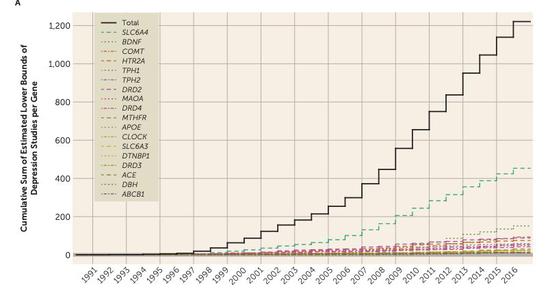Since the 1990s, a series of studies have found that 18 genes such as SLC6A4, BDNF, COMT, and HTR2A are closely related to the risk of depression. Since then, these genes have become the stars in the field of depression research - to date, more than 1,000 research papers on depression have been published.
However, a larger, more accurate study published in the American Journal of Psychiatry indicates that there is no evidence that these genes are closely related to depression, the human and financial resources that have been paid over the past two decades, and more than 1,000 A paper is likely to become a castle in the air.
Classic genes are questioned
In 1996, European scientists discovered that a particular gene, SLC6A4, may be associated with a risk of depression. They found that among 454 people with emotional disturbances, this gene was mutated and less active than 570 normal people. According to their theory, if a human carries a mutant of the gene, it will easily suffer from depression. Therefore, this finding can be used to diagnose emotional disorders and assess suicidal tendencies.
But at the time, DNA sequencing technology was not popular, so when researchers speculated that a gene had an effect on the disease, it was mostly speculated to select some so-called "candidate genes." For depression, SLC6A4 seems to be an excellent candidate because it encodes a serotonin transporter that regulates the reception of serotonin by brain cells, which are thought to be molecules associated with mood and depression. So over the next two decades, more than 450 papers were published based on the SLC6A4 study.
But a recent study found that the foundation of the building may not be strong, or even a castle without a foundation. Richard Border of the University of Colorado selected 18 so-called candidate genes related to depression, including the most widely studied SLC6A4. They conducted a number of big data studies to try to find out if a particular type of gene really exists in a depressed patient. “But we didn’t find any (positive) results.†Matthew Keller said he was the main participant in the study.
They found that there were more than 1,000 papers related to depression involving only these 18 genes. If the study is correct, what was the study of more than 1,000 previous articles? “This is enough to get people’s attention,†Keller said. “People have spent 20 years, countless human and financial resources, and the result is something that doesn’t exist.â€

From 1991 to 2016, more and more studies on 18 genes related to the risk of depression
“These people keep saying that these genes are useful, but that’s not the cause that bothers me,†says psychiatrist Scott Alexander. “What really makes me understand is that the whole theory is based on a fictional hypothesis.â€
“We spent a lot of energy exploring how SLC6A4 affects brain emotions, how it works in different countries and regions, and how it interacts with different genes. It's like researchers describing the life of unicorns, unicorns What to eat, which subgroups to categorize, and which part of the meat is best to eat.†Alexander wrote in his personal blog.
Large sample research reveals reality
Border and Keller's research is larger and more accurate than previous studies. “But I am not surprised by the results,†said geneticist Cathryn Lewis of King's University in London. Previously, scientists have said that SLC6A4 is linked to depression and is untenable, and when geneticists can finally sequence the entire human genome, they can find thousands of genes associated with mental disorders. Each gene has only a tiny function.
Even if it is tested whether these genes have a small function, the sample size of the volunteers participating in the study should be large enough. Previously, after many candidate genes were selected, the average sample of volunteers was only 345. Therefore, with such a sample, it is impossible for them to find a gene that has a significant association with depression. In this regard, it can only be said that these studies have made statistically low-level errors. Lewis said that it is not a candidate gene, but many researches still use candidate gene methods, but they will continue to update and improve on this basis, but depression research has stagnated.
Marcus Munafo of the University of Bristol said that he was infected with the SLC6A4 study in his early years and decided to join the field. "The research in this field looks flawless," he said. "But as I joined myself, I found out that A lot of things are untenable." This gene is sometimes associated with depression and sometimes it is not connected. The key point is that the more advanced the technology used in the study, the more the connection between the two disappears. So they conducted a large study in 2005, repeating the 1996 experiment, with the difference of 100,000 participants instead of 1,000 at the time. As a result, they found no association between SLC6A4 and depression.
“You might think that this would dispel the enthusiasm for people to study candidate genes, but in fact they don’t,†Munafo said. “These negative results are not what people want to hear.†In fact, after 2005, SLC6A4 was associated with depression. The research has grown rapidly, and the number of published papers has tripled over the next decade.
In many fields of science, including psychology and cancer biology, perhaps the same problem is faced: there are many experiments that are broadened and expanded on the basis of errors. This is why the scientific community faces the so-called “repetitive crisisâ€. Many researchers will only use the data they are interested in, even holding the answer to find the problem, and holding the results to establish the hypothesis. In order to better publish an article, it will pick out a positive result and discard the negative result, which causes many research results to be wrong.
In addition to those studies that deliberately tamper with the data, these scientists did not deliberately want to deceive anyone. They may just be in the academic field to publish a better article. Academic journals also like some particularly novel discoveries, rather than new changes in known things. Under the joint influence of the two parties, some research and publications with poor reproducibility were caused, and once the subsequent research swarmed, a certain research theory was established and became pervasive. Terrie Moffitt of Duke University also studied SLC6A4 in the early days, and he believes that the so-called candidate gene approach has lagged behind many new methods. "Candidate gene research is going downhill, and the research may be trivial," she said.

Image source: Pixabay
Common problem of scientific research
In 2003, Avshalom Caspi, Moffitt and other colleagues published a key study. They point out that people with a specific type of SLC6A4 gene are more likely to develop depressive symptoms after stress-stimulation. Although this article has been cited more than 8,000 times, it can only be explained under certain conditions and circumstances, and these genes do have potential impact. If more in-depth research finds that these genes do not seem to play any role, it is likely that these studies did not take into account the individual's special experience.
Border and Keller have previously heard about the uselessness of genetic research, so they will evaluate depression in many aspects, including face consultation, severity, and number of symptoms. At the same time, they also take into account many environmental factors, including trauma in childhood or adulthood, as well as socio-economic factors. Unfortunately, no environmental factors have worked, and many candidate genes do not affect the risk of depression in any environment.

Image source: pixabay
Similar arguments are constantly being staged in other areas. When some psychopathologists try to repeat previous large studies, someone will jump out and say that if you fail, it is likely that you have recruited different test volunteers. This kind of remark has not disappeared, but Border feels that "many people are not willing to touch the previous theoretical assumptions. After all, it is difficult for everyone to accept that things that have been studied for so many years are things that do not exist."
Keller even fears that the problems embodied in the research will lead to distrust of the scientific community. “There will even be people asking 'Scientists are studying something that has no root cause. Is global warming and chemistry still reliable?'â€
Keller also said that his research is not to deny that genes have a role in depression. If they can carry out newer, larger research, it may be possible to determine which gene is working. If it succeeds, it is these so-called candidate gene methods that have inspired the birth of better research. "I think that genetic research in psychiatry may be to regenerate from the theory of candidate genes and to ensure that such mistakes will not be made afterwards." This includes publishing data and setting strict standards for all psychiatric research.
Dorothy Bishop of Oxford University said that many research institutes and research funds also need to stand up. They can't let similar research exist, and research will waste a lot of money if it can't be repeated. The new scientific system and the atmosphere of scientific communication need to be constantly established. Only by taking history as a guide can we promote science to move forward.
Source: Research Circle
Manual Massage Collapsible Foot Spa Massager
The Manual Massage Foldable Foot Spa Massager is a portable compact device designed to give your feet a relaxing massage experience. Its foldable design makes it easy to store and transport, making it ideal for the frequent traveler.
Massagers typically have multiple massage rollers that apply pressure to different areas of the foot, providing a deep-tissue massage that can help relieve tension and improve circulation. Some models also feature heating and vibration to further enhance the massage experience.
To use the massager, you simply fill it with water and turn it on. The water will heat up and the massage rollers will go into action to provide a soothing massage that will help relax your feet.
Overall, the Manual Massage Foldable Foot Spa Massager is an excellent choice for anyone looking to relieve foot pain and tension in the comfort of their own home.
Manual Massage Collapsible Foot Spa Massager,Foot Bath Massager Machine,Electric Heated Foot Spa,Foot Bath Tub
Huaian Mimir Electric Appliance Co., LTD , https://www.nbmimirfootspa.com